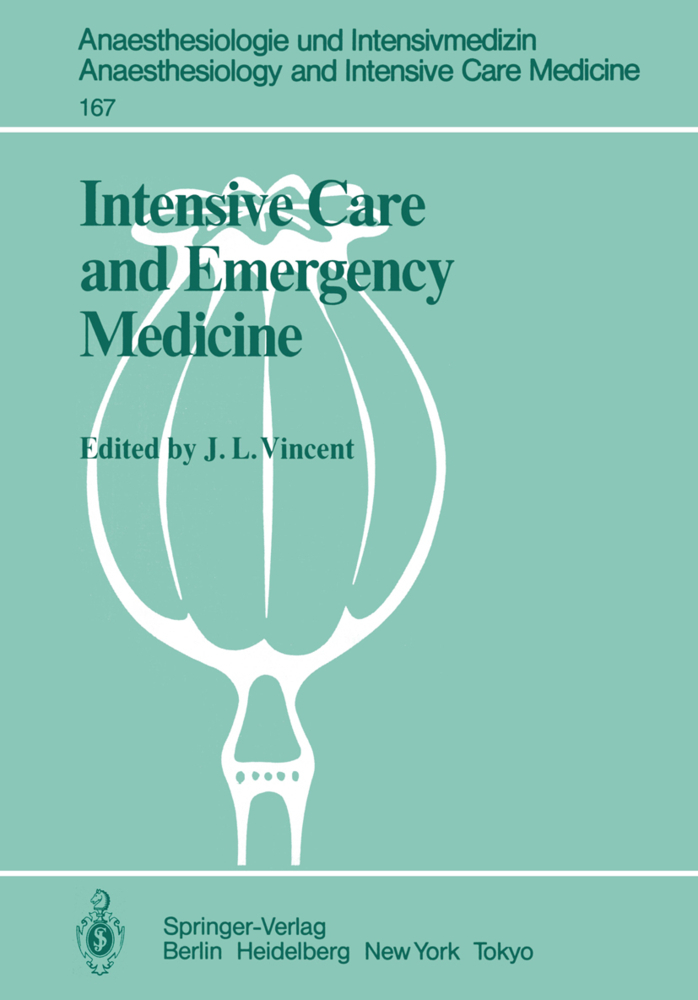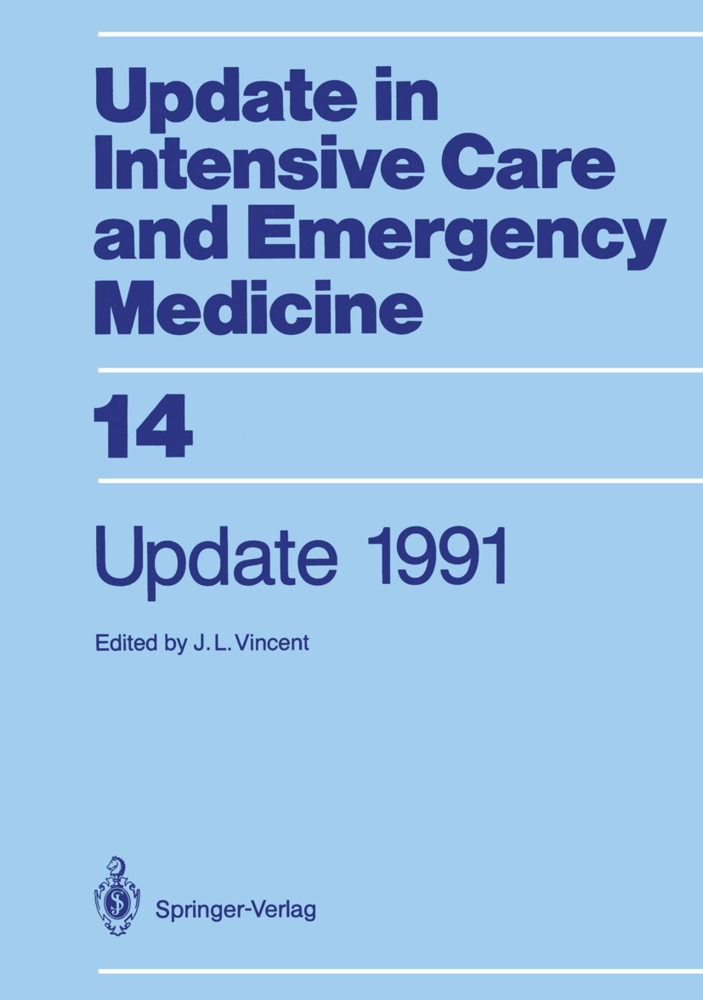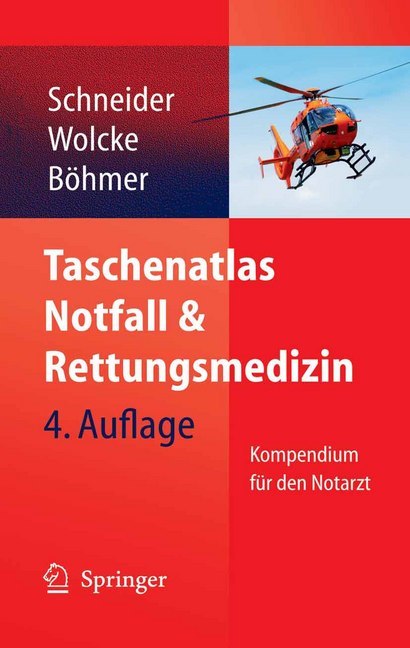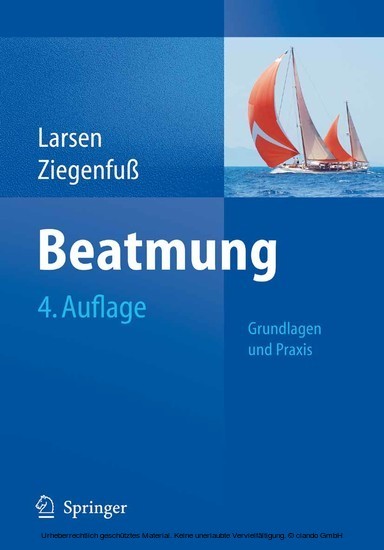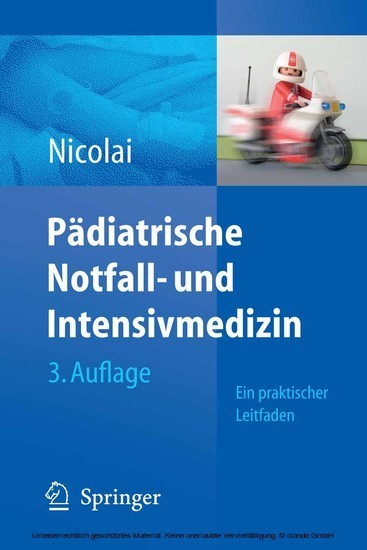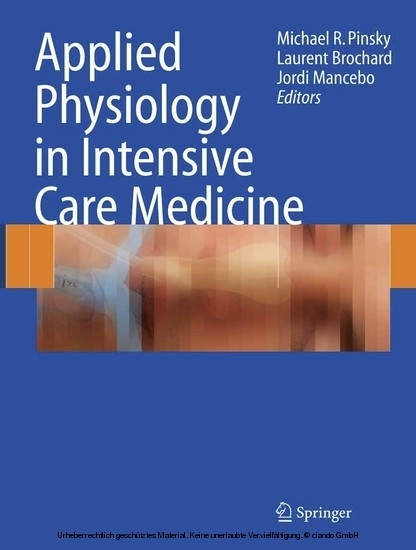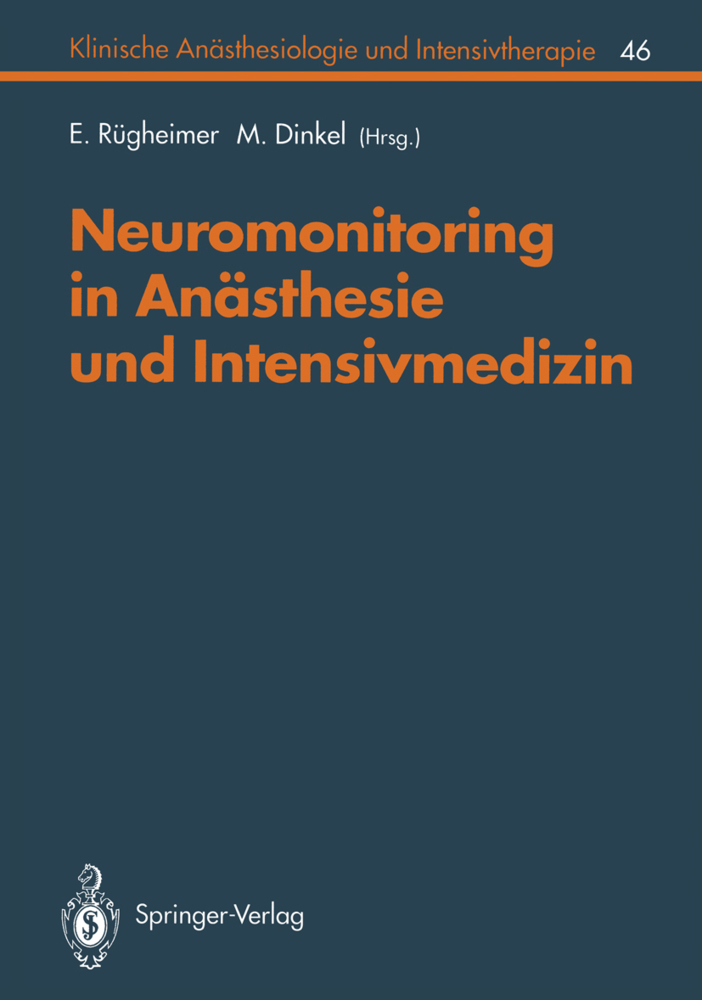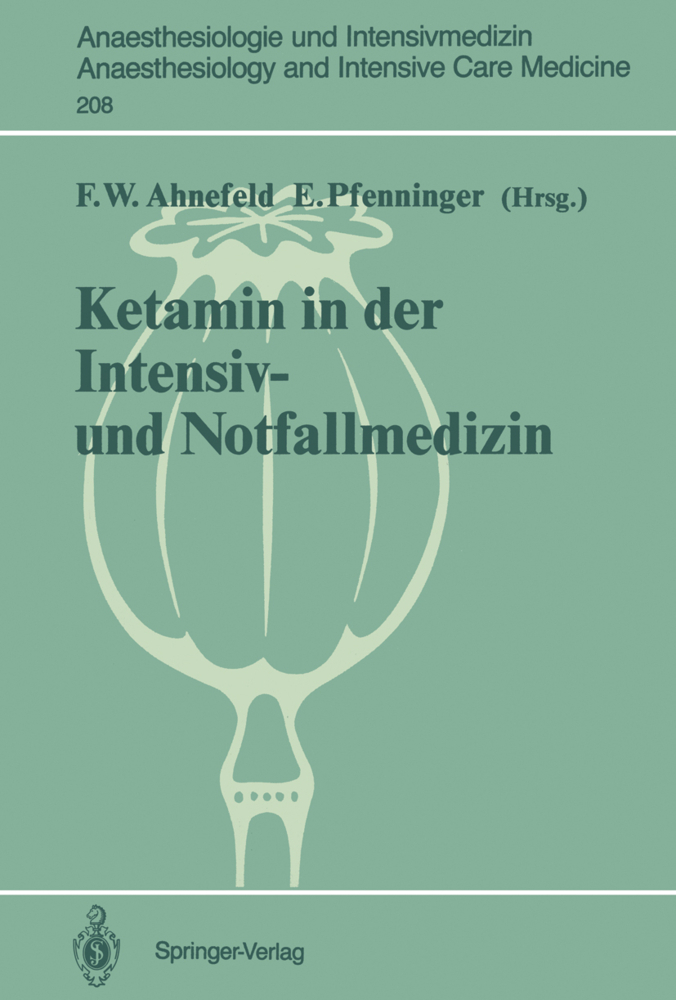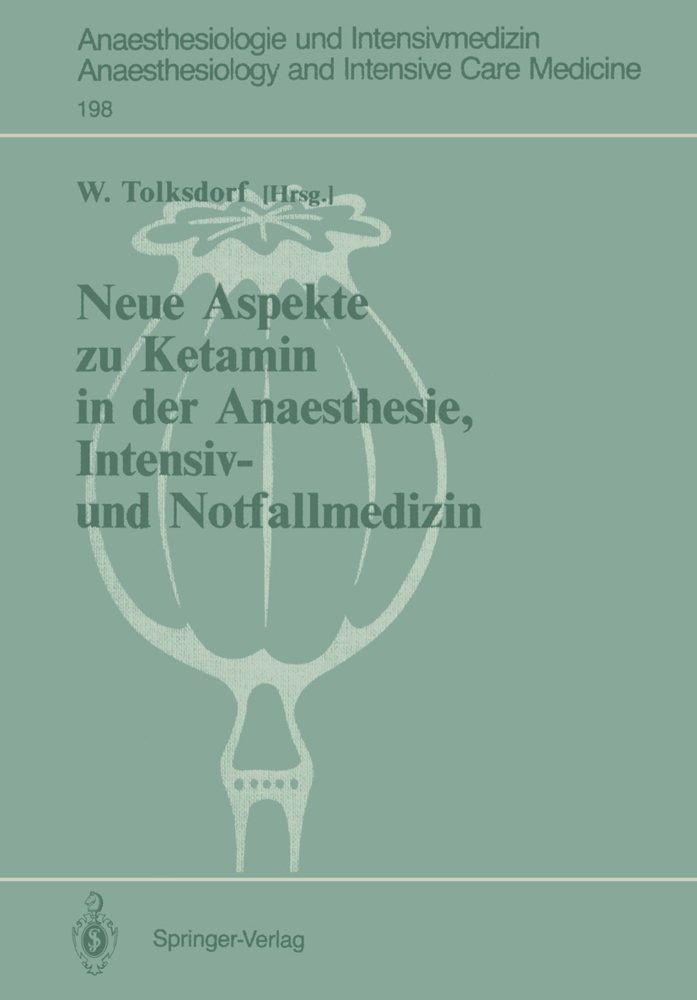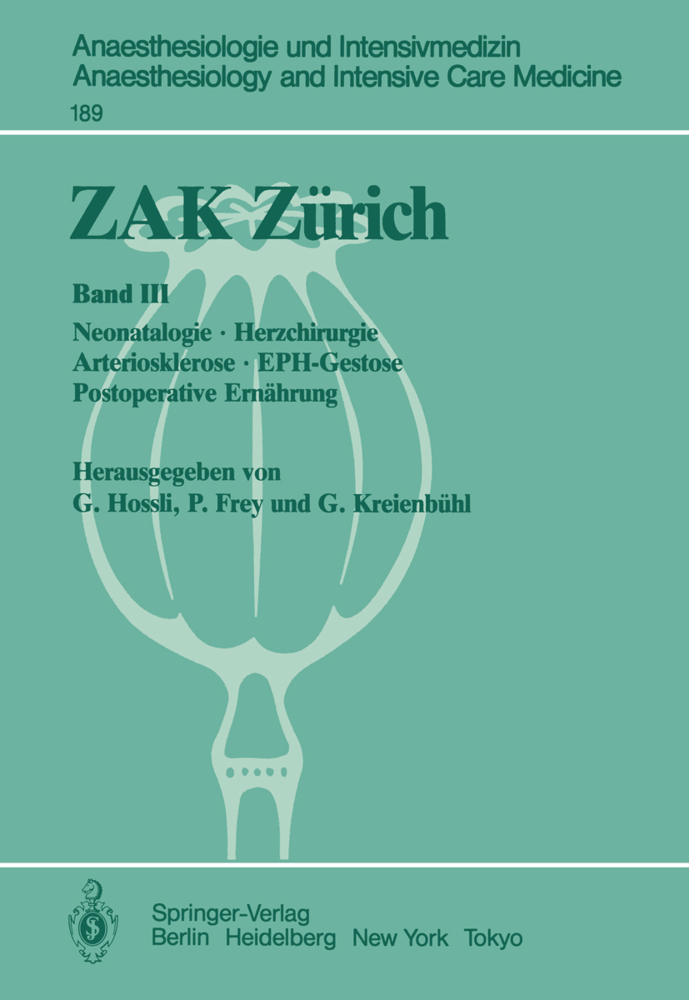Intensive Care and Emergency Medicine
4th International Symposium
Intensive Care and Emergency Medicine
4th International Symposium
The significance of a change in Pa02 occuring in a patient with cardiovascular instability cannot be ascertained unless the values for PV0 and CV02 are known. A fall in Pa02 could 2 reflect worsening of pulmonary function or deterioration of cardiac output (with resultant increase in systemic oxygen extraction). PEEP/CPAP would be an appropriate therapy in the former case but frankly deleterious in the latter if applied prior to cardiovascular stabiliza tion. References 1. Douglas ME, Downs JB, Dannemiller FJ et al (1976) Change in pulmonary venous admixture with varying inspired oxygen. Anesthesia and Analgesia 55:688-695 2. Kelman GR, Nunn JF, Prys-Roberts C et al (1967) The influence of cardiac output on arterial oxygena tion. A theoretical study. Br J Anaesth 39:450-458 3. Kirby RR (1986) Respiratory vs cardiovascular dysfunction - How can we differentiate? ASA Refresher Course Lectures, 102 4. Nunn JF (1977) Applied respiratory physiology (2nd ed). Butterworth et Co 5. Van Aken H, Lawin P (1981) Der EinfluB des Herzminutenvolumens auf die arterielle Oxygenation.
Role of Eicosanoids in the Development of ARDS
Circulating Mediators of the Adult Respiratory Distress Syndrome
Adult Respiratory Distress Syndrome: Treatment in the Next Decade
The IMV Controversy: Full VS Partial Ventilatory Support
Kidney Function in Response to Various Modes of Mechanical Ventilation
Wave Form Analysis as a Means of Controlling the Barometric Considerations Associated with Diffusive and Convective Intrapulmonary Ventilation
The Scientific Basis for PEEP Therapy
Barotrauma
Extracorporeal Support in ARDS: Update in 1984
The Swan-Ganz Catheter, a Tool in Intensive Care Medicine
The Role of Central and Peripheral ?- and ?-Adrenoceptors in the Control of Cardiovascular Function
Update in the Treatment of Acute Circulatory Failure
CPR: Calcium or Calcium-Antagonists?
Contractile Function of the Ischemic Myocardium
Arterial Hypoxia: Respiratory Versus Cardiovascular Dysfunction
Gram-Negative Bacterial Infections in the Critically Ill: Pathophysiological and Clinical Aspects
Prevention of Infection and Colonisation in Cardiac Surgical Intensive Care Patients
Safety Aspects of ?-Blockade in Acute Myocardial Infarction: Experiences from the Gothenburg Metoprolol Trial
Is Optimal Streptokinase Treatment Possible for Every Patient with Myocardial Infarction?
Pre- and In-Hospital Antiarrhythmic Prevention of Ventricular Fibrillation Complicating Acute Myocardial Infarction
Echocardiography in the Coronary Care Unit
Intensive Treatment of Acute Pancreatitis
Drugs in Prevention and Treatment of Acute Gastrointestinal Bleeding
Utilization of Energy Substrate in Critically Ill Patients.-Management of Hepatic Coma
Computer-Assisted Triage System for Large Volume Emergency Rooms
Fluid Repletion: Colloids and Crystalloids
Fluid and Electrolyte Management in the Critically Ill
Can Acute Renal Failure ("Acute Tubular Necrosis") be Prevented?
Cerebral Oedema in Head-Injured Patients
Factors Influencing Outcome after Multiple Trauma
Phased Disaster Response in University and Teaching Hospitals
Influence of Temperature on Arterial Blood Gases
Cardiovascular Function and Pulmonary Gas Exchange
Gas Exchange Alterations in Pulmonary Embolism
Pharmacokinetic Principles for Toxin Elimination in Poisoning
Antidotes in the Treatment of Acute Poisoning
Diagnosis and Treatment of Herpes Simplex Encephalitis in Adults
Management of Status Epilepticus
Imaging of the Critically Ill
Improving the Use of Intensive Care.
Treatment of Respiratory Failure Due to Advanced Chronic Obstructive Lung Disease
Non-Invasive Monitoring of the RespirationRole of Eicosanoids in the Development of ARDS
Circulating Mediators of the Adult Respiratory Distress Syndrome
Adult Respiratory Distress Syndrome: Treatment in the Next Decade
The IMV Controversy: Full VS Partial Ventilatory Support
Kidney Function in Response to Various Modes of Mechanical Ventilation
Wave Form Analysis as a Means of Controlling the Barometric Considerations Associated with Diffusive and Convective Intrapulmonary Ventilation
The Scientific Basis for PEEP Therapy
Barotrauma
Extracorporeal Support in ARDS: Update in 1984
The Swan-Ganz Catheter, a Tool in Intensive Care Medicine
The Role of Central and Peripheral ?- and ?-Adrenoceptors in the Control of Cardiovascular Function
Update in the Treatment of Acute Circulatory Failure
CPR: Calcium or Calcium-Antagonists?
Contractile Function of the Ischemic Myocardium
Arterial Hypoxia: Respiratory Versus Cardiovascular Dysfunction
Gram-Negative Bacterial Infections in the Critically Ill: Pathophysiological and Clinical Aspects
Prevention of Infection and Colonisation in Cardiac Surgical Intensive Care Patients
Safety Aspects of ?-Blockade in Acute Myocardial Infarction: Experiences from the Gothenburg Metoprolol Trial
Is Optimal Streptokinase Treatment Possible for Every Patient with Myocardial Infarction?
Pre- and In-Hospital Antiarrhythmic Prevention of Ventricular Fibrillation Complicating Acute Myocardial Infarction
Echocardiography in the Coronary Care Unit
Intensive Treatment of Acute Pancreatitis
Drugs in Prevention and Treatment of Acute Gastrointestinal Bleeding
Utilization of Energy Substrate in Critically Ill Patients.-Management of Hepatic Coma
Computer-Assisted Triage System for Large Volume Emergency Rooms
Fluid Repletion: Colloids and Crystalloids
Fluid and Electrolyte Management in the Critically Ill
Can Acute Renal Failure ("Acute Tubular Necrosis") be Prevented?
Cerebral Oedema in Head-Injured Patients
Factors Influencing Outcome after Multiple Trauma
Phased Disaster Response in University and Teaching Hospitals
Influence of Temperature on Arterial Blood Gases
Cardiovascular Function and Pulmonary Gas Exchange
Gas Exchange Alterations in Pulmonary Embolism
Pharmacokinetic Principles for Toxin Elimination in Poisoning
Antidotes in the Treatment of Acute Poisoning
Diagnosis and Treatment of Herpes Simplex Encephalitis in Adults
Management of Status Epilepticus
Imaging of the Critically Ill
Improving the Use of Intensive Care.
Vincent, J. L.
| ISBN | 978-3-540-13412-1 |
|---|---|
| Artikelnummer | 9783540134121 |
| Medientyp | Buch |
| Copyrightjahr | 1984 |
| Verlag | Springer, Berlin |
| Umfang | XIV, 192 Seiten |
| Abbildungen | XIV, 192 p. 7 illus. |
| Sprache | Englisch |

